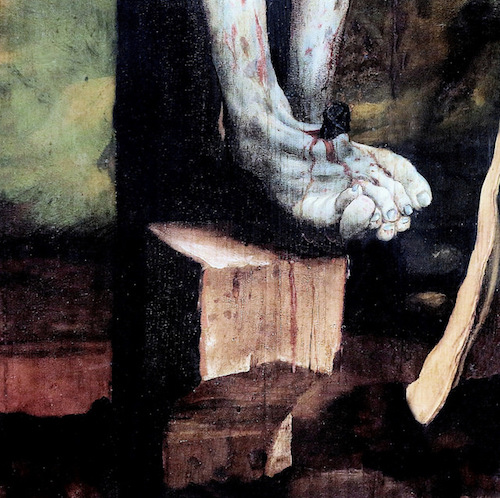We run our website the way we wished the whole internet worked: we provide high quality original content with no ads. We are funded solely by your direct support. Please consider supporting this project.

Nothing but Christ Crucified
One of the most remarkable expressions of the all-encompassing nature of the cross is reflected in an incidental, but extremely important, comment that Paul made in his First Letter to the Corinthians. He noted that when he brought “the testimony of God” to Corinth, he hadn’t come “with eloquence or human wisdom”. He instead “resolved to know nothing…except Jesus Christ and him crucified’ (I Cor. 1:1-2).
While this statement may be somewhat hyperbolic (did Paul really resolve to know absolutely nothing except Christ crucified?), it clearly implies that, for Paul, the entire gospel was found in the message of the cross. It implies that, when we understand what took place through the “foolishness of the cross,” we understand all that we need to know about God and about other humans. When you know the character of God revealed on the cross and what he thinks about us, as revealed on the cross, you’ve got the essence of all you need to know about anyone.
Excerpt from Benefit of the Doubt, pages 233-234
Photo credit: jean louis mazieres via Visualhunt / CC BY-NC-SA
Category: General
Tags: Cross, Good News, Identity in Christ, Jesus
Related Reading

Why Bart Ehrman Doesn’t Have to Ruin Your Christmas (Or Your Faith) Part 4
This is the fourth of several videos Greg put together to refute Bart Ehrman’s claims published in the article What Do We Really Know About Jesus? We hope you’re enjoying these! They really provide a great overall approach to Biblical Criticism. If you missed the first three installments you can find them here, here and here.

How Should We Respond to Bullies?
Greg answers a question from parents as to how their child should respond to a bully.

Close Encounters of the Third (Kingdom) Kind: A Reflection on the Missio Alliance Conference
What an incredible gathering we had last week! It was invigorating, informative and fun! What stands out most to me was the family-feel of the conference. Like most of you, I have usually felt a bit alien when attending Christian conferences throughout the years. Not this one. You could sense the shared kingdom ethos in…

How To Fix The Church: The Kingdom of God (Part 4)
God has leveraged everything on the Church loving like Jesus loved, as outlined in our previous posts in this series. “By this the world will know you are my disciples,” Jesus said, “by your love” (Jn 13:35). By God’s own design, Christ-like love is supposed to be the proof that Jesus is real. In John…

The Cleansing of the Temple and Non-Violence
Jesus’ cleansing of the Temple is the most commonly cited example of those who allege that he did not absolutize loving enemies or refraining from violence. I submit that this episode implies nothing of the sort. First, it is important that we understand that this episode was not an expression of unpremeditated anger on Jesus’…
